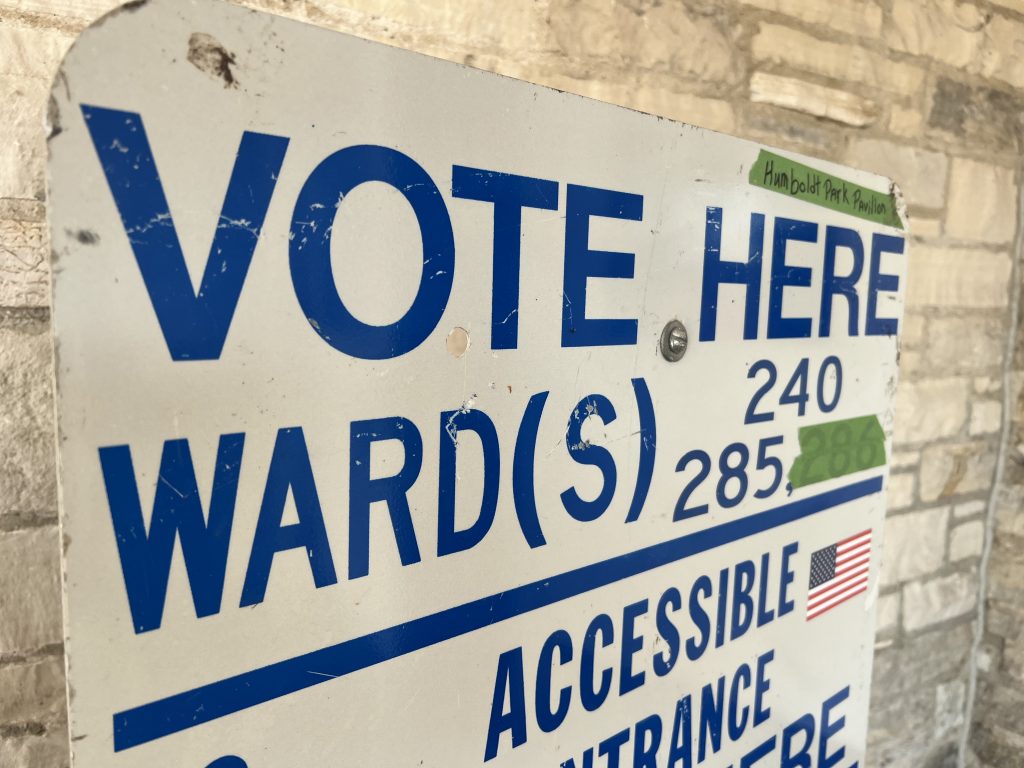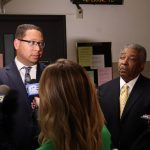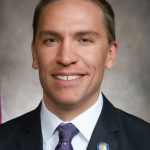What To Know About Wisconsin’s Non-Citizen Voting Referendum
The measure would change state constitution to limit voting to U.S. citizens. Would it have an impact?
A statewide proposal on the Nov. 5 ballot would amend language in the Wisconsin Constitution that limits voting to U.S. citizens.
Here’s what voters need to know.
What would the amendment change?
Wisconsin’s Constitution already requires voters to be U.S. citizens through language that specifies, “Every United States citizen age 18 or older who is a resident of an election district in this state is a qualified elector of that district.”
But, if the proposed amendment is approved by Wisconsin voters, the word “every” in that section would be changed to “only.”
It would also add a clause, spelling out that Wisconsin’s citizenship requirement applies to local, state and federal elections.

April Winfield, left, shows her ID before voting Tuesday, April 2, 2024, at the Beloit Public Library in Beloit, Wis. Angela Major/WPR
What are supporters saying about the proposal?
Under federal law, it’s already a crime for non-citizens to vote in federal elections. Wisconsin laws also require voters to be U.S. citizens, and the state’s voter registration form requires someone to check a box affirming that they’re a U.S. citizen.
But supporters of the amendment say the constitutional change would ensure Wisconsin’s voter citizenship requirement remains ironclad.
Although no jurisdictions in Wisconsin allow non-citizens to vote, there are more than a dozen communities in other states that let non-citizens vote in local elections, such as mayoral and school board races. All of the communities that allow non-citizen voting at the local level are in Maryland, California, Vermont or the District of Columbia.
Even if local officials in Wisconsin wanted to let non-citizens vote on local races or proposals, it’s not clear whether current state law would allow that change, according to analysis from the State Democracy Research Initiative at the University of Wisconsin Law School.
“Courts in other states have reached divergent conclusions about whether provisions akin to Wisconsin’s current constitutional text allow municipalities to authorize local noncitizen voting,” the analysis noted.
Nonetheless, while speaking in favor of the plan on the floor of the state Assembly last year, state Rep. Tyler August, R-Walworth, said Wisconsin should act to foreclose that possibility.
“Unfortunately, across the country, we have seen instances where local municipalities have decided to grant the right to vote, again that sovereign right for American citizens … to non-citizens,” August said. “When it comes to that sacred constitutional right, it should be U.S. citizens determining the future of their local municipality, their state, their school boards.”
What are the arguments against the amendment?
Wisconsin Family Action, a conservative organization, registered in favor of the proposal as it made its way through the Legislature. The groups that registered against it included Wisconsin’s League of Women Voters and Wisconsin Conservation Voters.
Critics say the changes are unnecessary, since Wisconsin already bans non-citizens from voting.
At the same time, opponents have argued the amendment could weaken voting rights by changing constitutional language about voter eligibility from “every” to “only.”
Currently, Wisconsin’s Constitution grants the right to vote to “every” adult U.S. citizen, although the Constitution spells out two exceptions — people convicted of felonies and people who’ve been declared mentally incompetent by a court.
Tim Muth, a senior attorney with the American Civil Liberties Union of Wisconsin, argues the amendment could make it easier for state lawmakers to restrict other groups of people from voting.
“The language in our constitution … currently says every citizen has this right,” Muth said. “It’s an inclusive provision. If you take away that provision, there is at least the possibility that a future Legislature might say, ‘Well, we want to, for example, prohibit people who have been convicted of misdemeanors from voting for a period of time.’”
Muth and other critics say the amendment could also help set the stage for Wisconsin officials to pass additional rules in the future, such as requiring voters to provide documentation that proves their citizenship.
“How many of you got your birth certificate locked and loaded and ready to go?” Nick Ramos, executive director of the Wisconsin Democracy Campaign, asked during a news conference in which groups spoke out against the ballot measure. “You’re going to continue to move the goal post farther and farther for eligible U.S. citizens who are already voting and should be allowed to vote. It’s not fair.”
What’s the national context surrounding this referendum?
Starting in 2018, voters in half a dozen states have approved changes to their state constitutions to explicitly ban voting by non-citizens. Similar proposals are on the ballot this November in eight states, including Wisconsin.
Anthony Chergosky, a political scientist at the University of Wisconsin-La Crosse, said he doesn’t expect Wisconsin’s referendum on voter eligibility to substantially drive turnout in the closely fought November election. Instead, he thinks Wisconsinites will be focused on races for the presidency and U.S. Senate.
“My guess would be that for a lot of voters, the first time they ever become aware of the amendment will be when they see it on their ballot,” Chergosky said.
“Republicans in Wisconsin have been under tremendous pressure from their base to take action on what they perceive as the issue of election integrity,” Chergosky said.
Illegal voting by non-citizens is exceedingly rare, research has found.
But opponents of Wisconsin’s referendum worry that Republicans are focusing on citizenship requirements, as part of a plan to cast doubt on the upcoming election results.
Former President Donald Trump continues to deny that he lost the 2020 election and, this election season, he’s repeated false claims about Democrats signing up large numbers of recently arrived migrants to vote illegally.
How did this proposal get to the ballot?
Republicans who control Wisconsin’s Legislature voted to bring the proposal to the ballot. To do so, they had to approve resolutions in two consecutive legislative sessions.
The new language will be added to the Wisconsin Constitution if it’s approved by a majority of voters statewide. It does not need the approval of Democratic Gov. Tony Evers to take effect, and Evers can’t veto it.
Limits on non-citizen voting: What to know about Wisconsin’s Nov. 5 referendum was originally published by Wisconsin Public Radio.
If you think stories like this are important, become a member of Urban Milwaukee and help support real, independent journalism. Plus you get some cool added benefits.























Sigh…another film-flam from the tin-hat crowd. Why don’t they concentrate on purging all the neo-Nazis in MAGA hats. They are a bigger threat to democracy than imaginary illegal voters.
If it passes, I would expect MAGA types to use the “only” language to try to challenge (harass) voters who they think “look like” non-citizens or don’t speak English.
“Republicans in Wisconsin have been under tremendous pressure from their base to take action on what they perceive as the issue of election integrity”
The Republican base can be convinced of anything, apparently. That’s why I am going to begin pushing for a statewide referendum that states that the sky is not always blue. Half of the time it is black. And this falsehood has been perpetuated by the left for centuries to try to control the minds of the electorate to vote for democrats.
As Frump himself stated in 2016: “I love the poorly educated”.